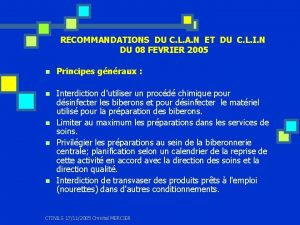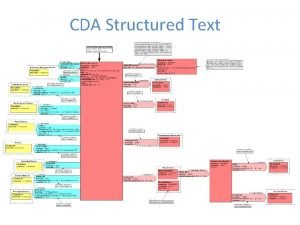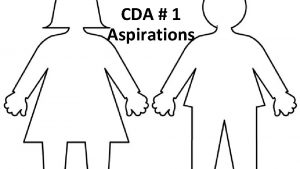Why and where CDA Franois Macary Christel Daniel








- Slides: 8

Why and where CDA François Macary, Christel Daniel

What is CDA? • Clinical Document Architecture (CDA) is an XML-based markup standard intended to specify the encoding, structure and semantics of clinical documents for exchange and sharing. • CDA is part of HL 7 V 3. As such, it relies on the HL 7 Reference Information Model and the HL 7 V 3 data type. • It enables to represent any static clinical content in a format, which is both human-readable and system-processable. • A single xml schema validates any kind of CDA document

Why CDA? • Messages are appropriate artifacts to support exchange of clinical information during the production of care. • The output of the process of care is better captured in static documents, persistently accountable to their authors and understandable per se to care providers. • The document sharing paradigm is the best fit to enable patient care coordination and care continuity among care providers and their systems, which are not coupled to one another. • IHE provides a set of infrastructure profiles around XDS, to support this document sharing paradigm. The shared content is most often CDA documents.

Validation & Conformance • A single xml schema CDA. xsd is used to validate any instance of CDA document. • A template of a CDA document is a set of constraints applied to the general standard. It is both a specification and a schematron, which tests the conformity of document instances to that template.

CDA content profiles in IHE domains Domain St. Profiles AP AP structured report (APSR): 1 generic + 20 organ specific templates Card. ITI Scanned documents (XDS-SD): 1 template with a non-structured body LAB Sharing laboratory reports (XD-LAB): 1 report template 7: Medical Documents, Medical Summary, Referral Summary, Discharge Summary, PHR Extract, PHR Update, Emergency Department Referral, 4: Antepartum History & Physical, Antepartum Summary, Antepartum Laboratory (from XD-LAB), Education 3: Labor and Delivery History & Physical, Labor and Delivery Summary, Maternal Discharge Summary 4 in emergency department: Triage Note, Nursing Note, Composite Triage & Nursing Note, ED Physician Note 3 document templates Patient Care Coordination (PCC) Pharmacy Cardiac Imaging Report Content (CIRC): 1 report template

Testing of content profiles at Connectathons 2011 #Systems as “Content Creator” Actor Profiles North-America 2011 PCC profiles 28 XD-LAB XDS-SD 5 13 Europe 2011 2 3 2

Adoption of CDA A number of countries have adopted CDA R 2 globally: • Finland was the first broad adopter • Austria: ELGA project • France: CDA is mandated for patient care coordination. XD-LAB has been chosen for lab reports. APSR is required for cancer case AP reports. However, lab system vendors are not ready yet. • US: in “meaningful use” ? In other countries, adoption is made at the regional level • Italy Veneto • US Regional Health Information Organizations (RHIOs), • Spain Catalogna …

Thank You















